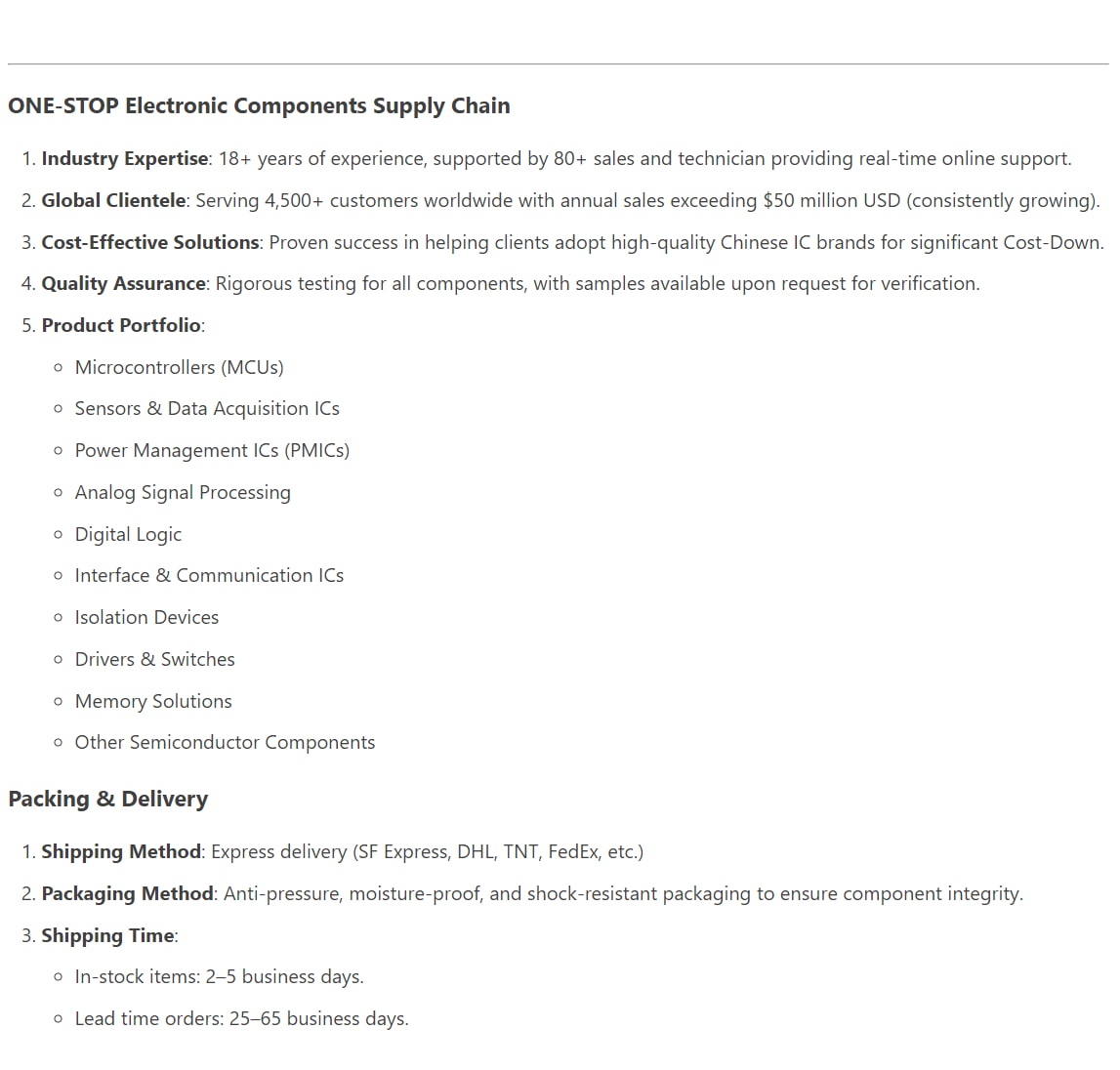RS595SXTSS16 is a Replacement parts of
MC74VHC595DTR2G/MC74HC595ADTR2G
/MM74HC595MX/74AHC595PW/74HC595PW
/74VHC595PW/74LVC595APW
/SN74AHC595PW/SN74HC595PW
RS595SXTSS16 has good quality and a cheaper price, which can effectively help you reduce costs and make your products more competitive. In addition, we have sufficient supply and stable price of this parts, which can greatly help you to avoid problems such as price increases and parts shortages of similar products from other brands.
Mfr.Part No. :
RS595SXTSS16Manufacturer :
RUNICDescription :
8-Bit Shift Registers With 3-State OutputPackaging :
ReelPackage :
TSSOP-16,SOIC-16(SOP16),QFN2.5×3.5-16LStock :
in stockPrice :
$0.10-$0.18
RS595SXTSS16
| Price: | $0.10-$0.18 | $0.25-$0.35 |
|
Replace parts:
Replacement parts:
Alternative parts:
Pin to pin parts:
|
RS595SXTSS16 |
MC74VHC595DTR2G
MC74HC595ADTR2G
MM74HC595MX
74AHC595PW
74HC595PW
74VHC595PW
74LVC595APW
SN74AHC595PW
SN74HC595PW
|
RS595SXTSS16 vs. MC74VHC595DTR2G
The RS595SXTSS16 provides several advantages over the MC74VHC595DTR2G, particularly in terms of speed and power efficiency. While both chips operate at similar logic levels, the RS595SXTSS16 offers faster data transfer rates, enabling quicker and more efficient data processing. Additionally, the RS595SXTSS16 has a lower power consumption compared to the MC74VHC595DTR2G, making it a more energy-efficient choice for applications with strict power constraints, such as battery-operated devices.
RS595SXTSS16 vs. MC74HC595ADTR2G
When compared to the MC74HC595ADTR2G, the RS595SXTSS16 excels in its broader voltage operation range. This allows the RS595SXTSS16 to seamlessly integrate into a wider variety of systems, especially those with mixed-voltage requirements. Moreover, the RS595SXTSS16's thermal management performance is superior, ensuring stable operation even at higher operating temperatures, while the MC74HC595ADTR2G may experience reduced performance in such conditions.
RS595SXTSS16 vs. MM74HC595MX
The RS595SXTSS16 outperforms the MM74HC595MX by offering enhanced speed and signal integrity. The RS595SXTSS16 supports faster switching times, which translates into a more responsive and efficient performance in time-sensitive applications. Furthermore, the RS595SXTSS16’s noise immunity is superior, ensuring that it performs reliably even in electrically noisy environments, a key advantage in industrial and automotive systems, where electromagnetic interference (EMI) is common.
RS595SXTSS16 vs. 74AHC595PW
The RS595SXTSS16 distinguishes itself from the 74AHC595PW by its superior data handling capabilities. The RS595SXTSS16 provides faster data throughput, making it ideal for high-speed applications where performance is critical. Additionally, the RS595SXTSS16 is more power-efficient, offering a lower quiescent current draw than the 74AHC595PW, which helps reduce the overall power budget in portable and power-sensitive designs.
RS595SXTSS16 vs. 74HC595PW
The RS595SXTSS16 offers enhanced operational stability when compared to the 74HC595PW. With better thermal performance, the RS595SXTSS16 is capable of sustaining higher operational temperatures without compromising its functionality. Additionally, the RS595SXTSS16 features better noise suppression capabilities, which ensures reliable communication in environments with high interference, making it a more robust solution for industrial control and automotive applications.
RS595SXTSS16 vs. 74VHC595PW
When compared to the 74VHC595PW, the RS595SXTSS16 stands out with its lower power consumption, even at higher data rates. This makes the RS595SXTSS16 more suitable for battery-powered applications or those that require energy efficiency. Additionally, the RS595SXTSS16 offers a higher level of signal integrity, ensuring minimal data distortion and faster data transmission, which is critical in communication-heavy applications such as data acquisition systems.
RS595SXTSS16 vs. 74LVC595APW
The RS595SXTSS16 offers superior voltage tolerance and is designed to perform reliably under a wider range of voltage conditions compared to the 74LVC595APW. This advantage makes the RS595SXTSS16 an ideal choice for applications that require compatibility with various logic levels. Additionally, the RS595SXTSS16’s faster switching times and lower power consumption give it a clear edge in terms of speed and efficiency over the 74LVC595APW.
RS595SXTSS16 vs. SN74AHC595PW
The RS595SXTSS16 outperforms the SN74AHC595PW in terms of thermal stability and power efficiency. It is able to maintain stable performance at higher temperatures, making it ideal for use in environments with fluctuating or elevated temperatures. In addition, the RS595SXTSS16 offers a higher data transfer rate and lower propagation delay, ensuring faster and more efficient data processing, which is particularly beneficial in high-speed applications.
RS595SXTSS16 vs. SN74HC595PW
Lastly, compared to the SN74HC595PW, the RS595SXTSS16 offers greater noise immunity, which is crucial for ensuring the reliability of the chip in electrically noisy environments. Additionally, the RS595SXTSS16 has improved signal fidelity, meaning it is more capable of maintaining data integrity in systems with high interference levels, making it a more reliable choice for industrial automation and automotive electronics applications.
Conclusion
In conclusion, the RS595SXTSS16 stands out from its competitors, such as the MC74VHC595DTR2G, MC74HC595ADTR2G, MM74HC595MX, 74AHC595PW, 74HC595PW, 74VHC595PW, 74LVC595APW, and SN74AHC595PW, due to its superior speed, lower power consumption, better noise immunity, and higher operational stability. These advantages make the RS595SXTSS16 the ideal choice for high-performance, energy-efficient, and reliable applications across various industries.

Hot Tags :